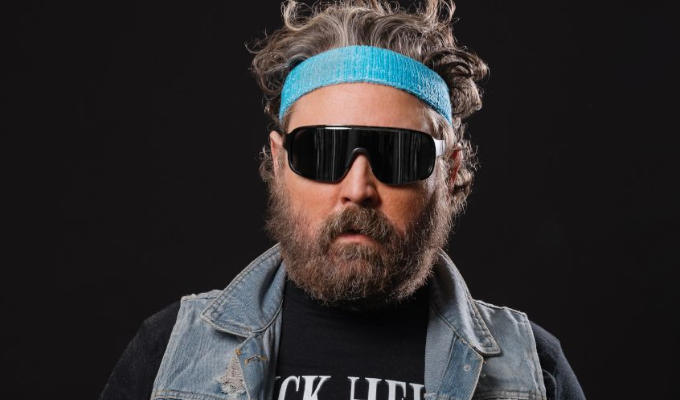Stewart Lee: Vegetable Stew at the Brighton Comedy Festival
Note: This review is from 2010
Review by Steve Bennett
A few years ago it would have been hard to believe Stewart Lee would ever play an 1,8000-seat venue on the strength of his own name. But his ongoing artistic and, to an extent, popular renaissance means he can make a decent attempt at filling it. And no one seems more surprised than him.
For although his profile, buoyed by his recent BBC Two series, has risen to the point that Alistair McGowan ‘does’ him; Lee is still an acquired taste, a wilfully inaccessible comedian who demands his audience’s patience on the promise he will reward it generously. Though a couple of times here, he tests that to the very limit.
Mainstream popularity is anathema to him: that his favourite targets include Adrian Chiles and Russell Howard should tell you that. And no, he doesn’t respect any code of honour among comedians – 20-plus years of uncompromising stand-up and unblemished integrity have given him elder statesman status and the right mock his colleagues. His take on how comedy has evolved from the radical days of alternative comedy when he started to the bland observational sets on ‘that Roadshow’ and the nastiness of Mock The Week is understandably astute.
Vegetable Stew, though a fully-fledged tour complete with support from Simon Munnery, it is also a work in progress. Lee is road-tesing material for the next BBC series, and he unapologetically announces at the start of the show, this will comprise three 25-minute routines, just about the length of a telly episode. However he, understandably, fears his Chiles piece might fall foul of the Beeb’s new guidelines on making derogatory remarks about real people.
Ever the comedians’ comedian, Lee delights in telling us exactly what he is going to do, to a minute degree, laying bare all the tricks of stand-up. It simultaneously flatters his audience by suggesting they are too savvy to fall for cheap callbacks, musical distractions or well-rehearsed performance gimmicks, while also setting a challenge for himself to succeed without the devices that will elicit easy laughs, even to the extent of forewarning us of material to come, robbing it of the very element of surprise that jokes are supposed to rely on for their effect.
He replaces that element of surprise with the element of anticipation. Because we’ve been told what to expect, and are suddenly acutely aware of the conventions that most comics employ, the laughs come in unusual places – in the pregnant pause before he goes into a material we have been primed for, at the slow repetition of a phrase, or at lines that are clearly not funny, but are made so because of we all know a ‘real’ comedian would put a gag there. It becomes a cat-and-mouse game, in which everyone knows where the punchline is, but the fun is in dancing around it.
This approach often sets off small packets of isolated laughs, but also can pay off handsomely when he decides to suddenly take a routine in a different direction. He sets standards so high that you feel a twinge of disappointment when he mentions such potentially hack subjects like Al Qaeda not being like the gentlemen terrorists of the IRA, but then finds a strong new line in it.
Elaborate extended routines are constructed around his crisp-loving grandfather, how Russell Howard delivers a kick in the teeth to the world’s poorest people every time he goes to work, and his encounter with David Cameron and his Etonian sense of entitlement when they were both students in Eighties Oxford.
This last routine is the one that doesn’t quite have the payoff it needs, although the effect may have been diminished because he pulled a similar trick in his last show, If You Prefer A Milder Comedian Please Ask For One. However it’s fairly certain that earlier version, based on a sustained, dark attack on Richard ‘The Hamster’ Hammond won’t be making it to primetime BBC Two, guidelines or no guidelines.
As Lee inevitably points out, there are periods when the show flags, leaving the audience to trust that it will be worth it in the end. And the jury is still be out on Lee’s attempts to introduce more music into his act – a wariness he references, but doesn’t wholly defuse.
But despite all the new acts who try to emulate him without grasping the real source of the humour, Lee’s shows are a unique experience, with a depth and thoughtfulness you almost certainly won’t find on ‘that Roadshow’.
Review date: 20 Oct 2010
Reviewed by: Steve Bennett
Reviewed at:
Brighton Dome






